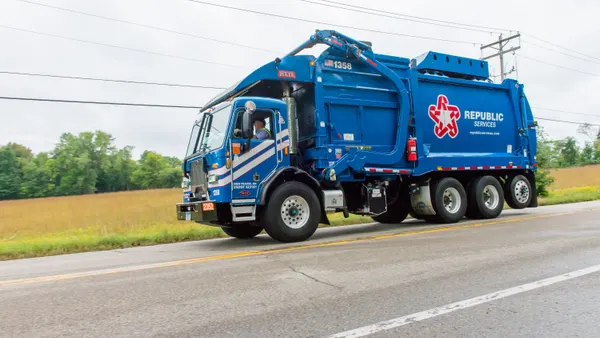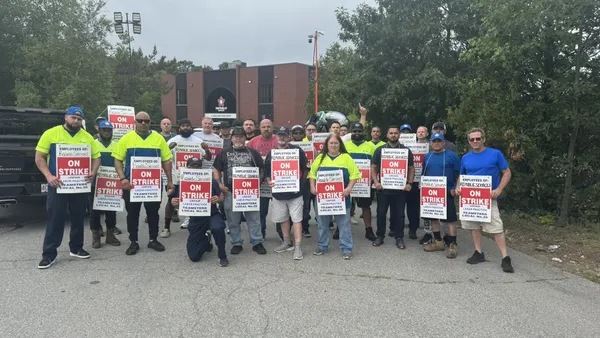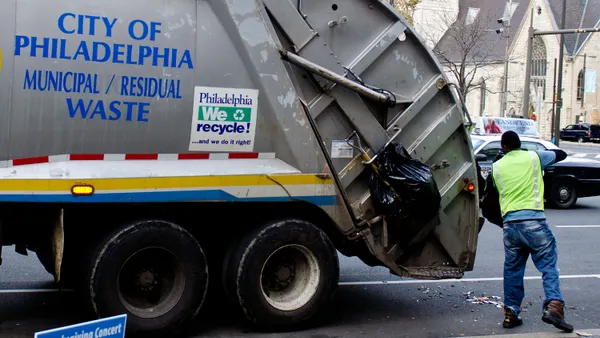"This job is as sweet as July jam," said Allen Davis, a nine-year employee of the DC Department of Public Works, when asked what he loves about his recycling collections job.
It's a sentiment I hadn't anticipated as we stood in the hot July sun, odors floating from the nearby recycling truck. However, he continued his praise of the occupation.
"There's a lot that can be said but when it all boils down to it, it's a beautiful job — even though it requires a lot of dirt and a whole lot of other stuff, you know what I mean?"
Before joining the crew on their Wednesday morning recycling collections route, I hadn't known what he meant. The extent of my experience with a collections crew was waving to the friendly garbagemen that service my apartment building. As a journalist for the industry, I'd only ever read of the challenges and rewards associated with being a refuse hauler. And while I speak with industry executives on a daily basis, I hadn’t ever stepped into the shoes of an employee on the front-line. That is, until DC DPW agreed to take me out on the route.
Following the DPW recycling collections crew through a Northeast neighborhood of the District, I learned valuable lessons — like how patience is a virtue, timing is everything and befriending your customers will automatically improve your career experience. I also was offered insight on the industry from three men representing the most hands-on job waste and recycling has to offer.
The following are my biggest takeaways from my day on the road with DC DPW.
Collecting refuse is a workout
Raymond Evans, a collections worker who has been hauling refuse for 15 years, wiped sweat off his brow as he said, "This is my exercise."
For five days a week, the DPW collections workers conduct an "old-school" practice of lifting heavy bins into the trucks — the fleet is not yet automated — then running those bins back to the curbs. For rear-end pickups, the crews jog alongside the slow-rolling truck as bins are quickly dumped and returned without missing a beat.
When it comes to public service, the workers don't let physical exhaustion get in the way of helping out a customer. "If they're handicapped, or if they're someone we're familiar with who's OK with us coming into the yard, we'll go get [their bin]. Even if we see their can is overfilled, we'll go get it because if we don't, then next week it's more," said Evans.
The occasional uncooperative customer keeps workers on their toes, too. Anthony White, a supervisor with DPW, mentioned that customers will sometimes leave trash scattered across public roadways — or wherever it lands after it's tossed outside.
"[Someone will] toss the bag out the window, it grabs the fence, trash everywhere. Now we have to come and clean this stuff up," explained White.
Needless to say, these workers definitely reach their 10,000 steps each day.
Compatibility is key
For successful and enjoyable collections services, the workers must be comfortable with their routes, their customers and, most importantly, each other.
"If you have a driver who's not paying attention, who's not looking out of both mirrors, and not looking at his men to make sure they're in the proper position, then it can be unsafe," said Davis. "Most of the techs on the back of the trucks, they're familiar with the driver — especially if it's the same driver they have every day. If it's a new driver, the apprehension may come in, especially if it's someone who's new to trash coming from another division ... and doesn't know how to maneuver in the alleys ... There can be some apprehension right there."
It hadn't occurred to me that compatibility among the crew was so important, but it's the same in any work setting: the better that people work together, the more successful the outcome. It's also a matter of safety. As the fifth most dangerous occupation in the country, it's important that collections workers feel safe with their crews — especially if they were to ever face a life-threatening situation.
"This crew, they jell together pretty good. The stick to the process. They try to be public servants," said White of his employees.
And, just like with many occupations, such compatibility can lead to lifelong relationships that enhance the quality of the job. "When you come here, you’re not looking for a friendship, but in time you build a family," said Evans.
Communities need (much more) education
While private companies, federal programs and industry associations have all worked tirelessly to promote consumer awareness regarding many facets of waste and recycling, it is clear that more public awareness is needed — especially when it comes to the safety of truck drivers and workers. In the time that I spent with DPW, I witnessed three cars speed past the collections truck, all on a neighborhood street.
"The public just needs to be patient. That's all, have a little patience. We're doing the best we can. Everybody needs to work together," said Davis.
Efforts like Slow Down to Get Around are reaching states across the nation, and even DPW is working on educational programs. However keeping education up-to-speed is difficult as Washington's population grows so rapidly, said former DPW Public Information Officer Linda Grant. She explained that the city's "Truck Touch" events are helping to keep the public interested in waste management practices.
"The little kids are so cute, but it's the dads who are just so funny! They are as fascinated with these trucks as their kids are, so we let them get up into the trucks, they can toot the horn, it's just fun. I learned to bring earplugs though," said Grant.
Outside of truck awareness, the crew expressed a need for consumers to be more aware of what can and cannot go into the refuse bins. More education on this front would save both time and frustrations for everyone involved. And, according to Evans, the collectors and customers should be working as a team for waste collections to be done properly.
"If everybody just takes the time to be educated and take pride in what it is they're doing, it makes everything easy … It cuts down on complaints and everything right there. That's my whole thing, teamwork," he said.
Odor? Get over it
Sure, waste and recycling operations carry a stigma of being "dirty jobs," but sometimes the jobs can quite literally stink — especially in the heat of the summer.
While the recycling trucks don't carry as much fragrant material as the trash trucks do, they still weren't pleasant. But that's nothing that Evans would complain about.
"You get used to it. It's your job; it's your way of living and your means of surviving," he said.
The crew discussed how important it is for consumers to take care of bins and keep them closed, not only to protect refuse from vermin and rain, but also to keep those challenges from creating unnecessary odors in the bins (which, of course, the crews would need to deal with).
However when it all comes down to it, White keeps a pretty simple motto: it is what it is.
"You have to get used to it because there's not really much that you can do," he said. "You're not really a trash man until you’re used to the smell."











